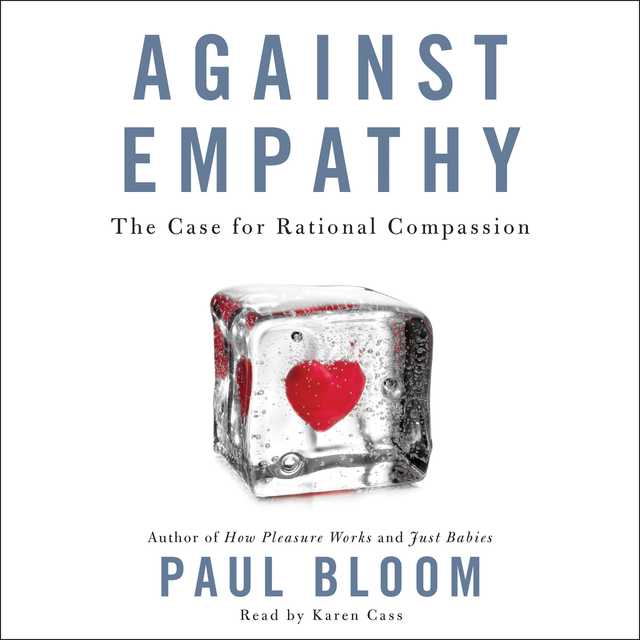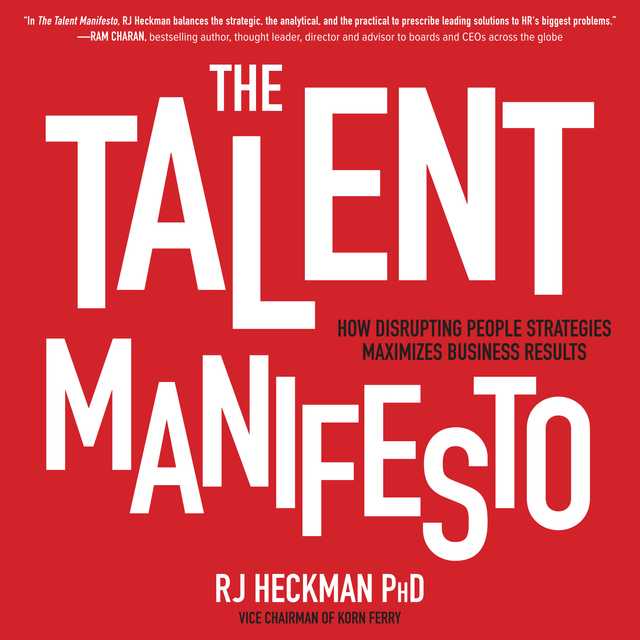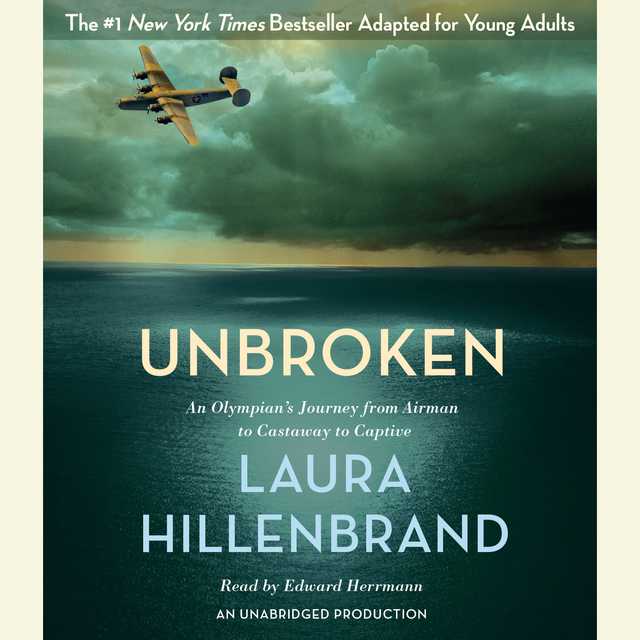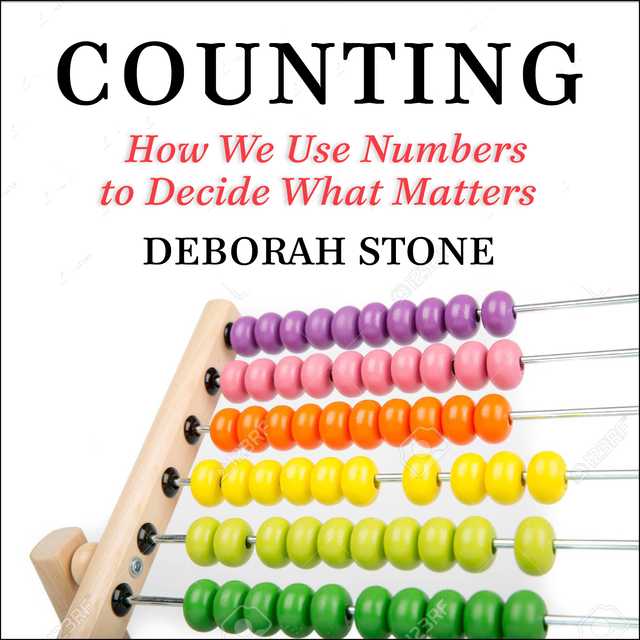Against Empathy Audiobook Summary
A controversial call to arms, Against Empathy argues that the natural impulse to share the feelings of others can lead to immoral choices in both public policy and in our intimate relationships with friends and family.
Most people, including many policy makers, activists, scientists, and philosophers, have encouraged us to be more empathetic–to feel the pain and pleasure of others. Yale researcher and author Paul Bloom argues that this is a mistake. Far from leading us to improve the lives of others, empathy is a capricious and irrational emotion that appeals to our narrow prejudices. It muddles our judgment and often leads to cruelty. We are at our best when we are smart enough not to rely on it, and draw upon a more distanced compassion.
Based on groundbreaking scientific findings, Against Empathy makes the case that some of the worst decisions that individuals and nations make–from who to give money to, when to go to war, how to respond to climate change, and who to put in prison–are too often motivated by honest, yet misplaced, emotions. With clear and witty prose, Bloom demonstrates how empathy distorts our judgment in every aspect of our lives, from philanthropy and charity to the justice system; from culture and education to foreign policy and war. Without empathy, Bloom insists, our decisions would be clearer, fairer, and ultimately more moral.
Bound to be controversial, Against Empathy shows us that, when it comes to major policy decisions and the choices we make in our everyday lives, limiting our empathetic emotions is often the most compassionate choice we can make.
Other Top Audiobooks
Against Empathy Audiobook Narrator
Karen Cass is the narrator of Against Empathy audiobook that was written by Paul Bloom
Paul Bloom is Professor of Psychology at the University of Toronto, and the Brooks and Suzanne Ragen Professor Emeritus of Psychology at Yale University. His research explores the psychology of morality, identity, and pleasure. Bloom is the recipient of multiple awards and honors, including, most recently, the million-dollar Klaus J. Jacobs Research Prize. He has written for scientific journals such as Nature and Science, and for the New York Times, the New Yorker, and the Atlantic Monthly. He is the author or editor of eight books, including Against Empathy, Just Babies, How Pleasure Works, Descartes’ Baby, and, most recently, The Sweet Spot.
About the Author(s) of Against Empathy
Paul Bloom is the author of Against Empathy
More From the Same
- Author : Paul Bloom
- Psych
- Just Babies
- The Sweet Spot
- Publisher : HarperAudio
- Abraham
- American Gods [TV Tie-In]
- Dead Ringer
- House of Sand and Fog
- Prey
Against Empathy Full Details
| Narrator | Karen Cass |
| Length | 7 hours 30 minutes |
| Author | Paul Bloom |
| Category | |
| Publisher | HarperAudio |
| Release date | December 06, 2016 |
| ISBN | 9780062571847 |
Subjects
The publisher of the Against Empathy is HarperAudio. includes the following subjects: The BISAC Subject Code is General, Psychology
Additional info
The publisher of the Against Empathy is HarperAudio. The imprint is HarperAudio. It is supplied by HarperAudio. The ISBN-13 is 9780062571847.
Global Availability
This book is only available in the United States.
Goodreads Reviews
Moshe
April 09, 2022
"Against Empathy" does a nice job summarizing all the limitations of empathy, and our altruistic drives more generally, such as being nicer to our kin and neighbors, and being especially prone to newsworthy suffering and insensitive to numbers, scale, and efficacy. Paul rightly points out that our logical arguments and conscious deliberation often lead us toward more utilitarian considerations that are a better way to do good. In the process he reviews a ton of interesting experiments and anecdotes in a thoroughly readable book.
Charlene
February 21, 2017
Absolutely BRILLIANT! This is a must read for anyone interested in things like:decision-makingempathyingroup/outgroup dynamicspolicy makingsocial constructsinequalitylogic v. emotional regulation on a grand scale Why out of 293 Goodreads reviews does this book only have a 3.75? I can't say for sure, especially since I have not taken the time to read all the negative reviews, but I suspect they come from people who pride themselves on being "a good person", because they identify as an empathetic person. They see that as a positive thing, no matter what the result of their emotional decisions. But, just as we came to understand that oxytocin is not just the "love and trust drug" and that it is also a key regulator of ingroup/ outgroup thinking (which results in poor treatment for the outgroup), humans are now beginning to understand the downside, and in fact often immoral side, of empathy. Empathy too often results in local empathy that is the equivalent of being on teams, which results in team-like dynamics. The reality is that often when you empathize with one person or one side of an argument, you close yourself off to the other side or the other person. I am not talking about giving 2 sides of an argument equal billing. For example, if one person is being racist, sexist, or otherwise oppressive, the logical course of action is not to give both sides equal empathy or equal consideration. That is not what this book is about. This book is about how to follow multiple lines of logic and not let knee-jerk local empathetic reactions to your favorite people or favorite causes blind you to the realities of decision-making. There are better ways, if you follow the logic all the way out *and* use your emotions, to come up with the best outcomes -- no matter if they are for your personal life, for the wellbeing of whole societies, or affect things on a global scale.Empathy can often lead to dynamics that involve impulsivity, manipulation, logical inconsistencies, and suboptimal outcomes. This is one of the most exciting books in the social sciences to come in a long time. A+** Note: Bloom also clarified what he has come to understand since writing Just Babies. As new evidence filtered in, he saw that he was mistaken about some things and updated his thinking and shared that with his reader. I love any author who updates based on new evidence and is willing to own up to it. (Are you taking notes Dawkins?)
Nicky
October 22, 2018
Reviewed for The Bibliophibian.“Against empathy? How could anyone be against empathy?”That was probably my first reaction too, because I and the people around me are all focused on being good to other people, and empathy seems to offer a way to do that. It seems to offer us insight, so we know the right things to say and do. But Paul Bloom’s contention is that empathy doesn’t always lead us in the right direction: he reminds the reader that empathy is what makes us focus on one sick child whose name and face we know, even if we don’t actually know the child is even real, over tens or hundreds of other sick children. Empathy can focus us powerfully on feeling how a single other person “must” be feeling — and therein lies the problem. It’s hard, if not impossible, to empathise with everyone in a whole crowd, and our instincts aren’t always accurate in guessing how other people feel. If they were, then we’d never say exactly the wrong thing when we want to comfort someone who is sad — we’d know what to say.What Bloom isn’t against is compassion: he speaks admiringly of the Buddhist ideal of compassion without attachment, for instance. Compassion linked with reason can indeed guide us to do good, to do the moral thing, to ensure he hurt the least number of people. But empathy — pure “I feel what you feel” emotional attachment leads us astray, and Bloom argues that point well.To empathise is a human emotion that many of us share, and Bloom isn’t claiming it’s inherently a bad thing. That would be to misread the book entirely. Honestly, despite often thinking that empathy is a virtue and people can do more of it, I find it difficult to disagree with Bloom’s conclusions. Part of that is that he writes really clearly, which makes it easy to knee-jerk believe that he’s right, but I think I’ll still be thinking about (and agreeing with) this in a few days, weeks, months.Time to look up Effective Altruism again, and do something with the information this time.
Jennifer
February 06, 2017
I saw the title of this book and I had to read it. I mean, who could be opposed to empathy? Does he want us to stop being nice to each other?The subtitle of the book offers a clue: Bloom would prefer us to be compassionate in more rational ways. When we 'put ourselves in others' shoes,' which is what many mean by the term empathy, it can lead to some irrational, even horrifying results. Whether it's making feel-good donations rather than researching to see where our charitable contributions would do the most good, or torturing enemies in the hopes of helping the people we like, that particular type of empathy can be too insular.So in the end, Bloom doesn't want us to stop being kind, but rather to examine our motives and the results more deeply.
Amirography
January 26, 2019
This book offers a great argument against what we think of as empathy in psychology: the ability to feel what others feel.Though the book was written by a prominent child psychologist I failed to find anything about psychology that I did not know already. Also the author failed to offer any explanation about why empathy came to be from evolutionary perspective. So I can say that this book was mostly a philosophical, ethical arguement against the use of empathy as our moral compass.The writing style was in Steven Pinker called "classic style". And it was page turner.
fromcouchtomoon
February 12, 2017
Interesting argument, but misleading title, as it's not empathy he's railing against, but small-mindedness. Packaged to be provocative without being as provocative as claimed.
H.A.
October 14, 2021
This is a fascinating read that offers an intelligent and stimulating discussion about why empathy is not only overrated but when looked at more closely can lead to bad decisions, prejudice and myopic and counterproductive behaviour.Take a simple thought experiment: you are telling your GP about the pain that you are currently experiencing and as you describe the symptoms, his facial expression starts to take on a pained look, he gets more and more distressed as you describe what the pain is like, where it’s located and you watch your doctor looking physically affected, scrunching his shoulders and rubbing the areas where you are describing the location of your pain. The doctor’s behaviour is likely to increase the patient’s worry and shows that empathy – the feeling with someone – is not reassuring, will influence the professional’s state of mind and capacity for an objective examination and suggestion for treatment.I offered an extreme example and I’d argue that imagining the opposite of empathy which would be a doctor distracted, cold and lacking any sympathy is equally distressing and counterproductive for a patient in need of help.What Bloom is aiming to show though is that empathy can be more problematic than we are led to believe and that rational empathy or compassion and care is a better approach to assist someone in distress.He examines the negative effects via a series of evidence-based arguments that give the following result:1, You can only identify with one person when you empathise which restricts your view on the overall situation. This fact can mean that many others deserving of sympathy will not be considered.2, Empathy can make you blind or myopic to the concerns for future generations because you focus on only one aspect of a situation.3, Empathy is often prejudiced because it is easy to identify with family, friends, people similar to us in culture and outlook but more difficult to apply towards strangers who we struggle to identify with.4, Empathy leads to an emotional rather than a rational response.5, The selfish aspect of empathic care leads to ineffective responses – i.e. we take care of someone’s frustration not because we care but because we wish to reduce the impact their emotion is having on us, the frustration (felt vicariously) it creates in us.As my previous example of the doctor patient situation shows, too much empathy means that the doctor not only recognises the pain but is himself in pain due to emphatic distress. This stops him to do a good job, or worse, do his job at all because his pain is increasingly more painful until he has to tend to his own before he can consider a solution for his patient.What the patient needs is a doctor who is fully present, listens carefully and calmly collects the information he needs to assess the reason for the medical complaint. This can be done without feeling with the person in need of care because a doctor has learned to associate symptoms with pathologies and his genuine attention to detail without emotional distraction is paramount to the ability in facing many patients in a day. Compassion and focused care are therefore distinguished from emotional empathy because it creates the opportunity for the patient to talk about all their problems without fear of shocking the doctor who in turn is able o make the correct diagnosis and treatment so both of them can move on to their next task.‘In contrast to empathy, compassion does not mean sharing the suffering of the other: rather, it is characterized by feelings of warmth, concern and care for the other, as well as a strong motivation to improve the others well-being. Compassion is feeling for not feeling with the other.’Therefore, empathy impacts on our rationality and good moral decision making. In one sense it is a useful tool to understand that pain can be shared, such as grief for a loved one, the severity of an injury or show how much we do care for our friends and family. In another sense, it reduces our vision to a small group of people, at the expense of others equally worthy of concern and consideration.Hence, rational compassion is to be favoured – objective, logical analysis of costs and benefits, with a sympathetic approach that allows for a detached but beneficial concern for the wellbeing of others. Bloom argues this with fascinating evidence, well-presented logic and – pardon the pun – empathetic conviction. We could learn a lot from that outlook to become better parents, friends and citizens of the world. Once we are aware of the difference between sympathy – the feeling for (I notice that you’re in pain) and empathy – the feeling with (I feel your pain) we can assist others better.‘Not only can compassion and kindness exist independently of empathy, they are some times opposed. Sometimes we are better people if we suppress our empathic feelings.’The Book in three words: engaging, intelligent and thoughtfulI’d love to know your thoughts on the book if you’ve read it!
Leo
March 10, 2019
I think this book changed my brain for the better.
Daniel
February 26, 2017
This is one of those rare books that challenge my assumption about morality and it is great. Empathy is the ability for us to feel what others feel. It has recently been touted as the most important attribute for successful and moral lives. It turns out that it is probably false. Empathy is:1. Narrow minded (we feel more for people who are like us, attractive etc)2. Innumerate (we don't feel more sad if 5000 people suffer vs 1 person. Indeed it may be that we feel more for one person who is spot lighted by the media, then the ignored millions)3. Able to lead us to make poor judgements (favouring the person who is spotlighted than the others equally deserving but unspotlighted ones.)4. Able to paralysed someone if they feel too much (Doctors and Lawyers)5. Not moral by itself and can lead equally to helping or avoiding 6. Not the best marker for benevolence. Rational thinking is. I was changed from being sceptical when I read the prologue to being convinced at the end. Good book.
Moh.
August 04, 2019
"Against Empathy" provides a wealth of scientific research to show empathy for what it really is: a flawed emotional reaction that has led countless people to make bad decisions. While many voices have called for others to have more empathy, Paul Bloom shows us that empathy can make things worse rather than better.Basing his argument on groundbreaking scientific findings, Bloom makes the case that some of the worst decisions made by individuals and nations—who to give money to, when to go to war, how to respond to climate change, and who to imprison—are too often motivated by honest, yet misplaced, emotions. With precision and wit, he demonstrates how empathy distorts our judgment in every aspect of our lives, from philanthropy and charity to the justice system; from medical care and education to parenting and marriage. Without empathy, Bloom insists, our decisions would be clearer, fairer, and—yes—ultimately more moral.*I managed to listen audio-book in blinkist.com
F.
February 14, 2020
The case against empathy and for compassion is well argued and engagingly told. Some sections feel a little unfinished and the thread lost. But overall a very good book.
Michael
February 23, 2019
Being against empathy, Paul Bloom acknowledge at the beginning of his book Against Empathy is roughly the same as being against kittens. This is because most people see empathy is an ultimate good, so, when you say you are against it, you end up sounding like you are against love and compassion and morality and everything else that separates us from Hannibal Lector (who makes an appearance in the book too). Empathy is hard to be against because most people have too broad a definition of it.He is right, I think, but he never entirely overcomes the definitional problem in his own analysis. He is not entirely consistent about what kind of empathy he is against. To be fair, he qualifies and hedges on almost every page, and he constantly draws attention to the problems with defining the term--making it very clear that he is not against empathy if it means "every good thing." But he does not narrow the term quite the same way in every chapter.But there is a default setting. Most of the time, he defines "empathy" very narrowly and in almost exactly the same terms that Adam Smith defines "sympathy" in his Theory of Moral Sentiments. Empathy/Sympathy in these terms is a physiological and sensory connection in which the empathizer experiences a scaled-down version of the same responses that the empathizee feels. This is neat and stuff, but (like many arguments of this sort) it sets up a weak version of the argument that is self-evidently true and hardly worth making, and a strong version that is ridiculous and overstated and impossible to maintain. The weak version of the argument constricts empathy so far that it really only applies to connections between people who are extremely close to each other and, in very real ways, "feel each other's pain." The strong version of the argument blurs empathy with compassion and really does start to sound like kitten-hating.But there is space between the weak and strong versions for Bloom to work in, and he spends a lot of the book there making important points like--Empathy is extremely susceptible to what he does not but might as well name as the availability heuristic. When we see a cute child on television who has fallen down a well, we become willing to expend gazillions of dollars to rescue the child--without really considering how many other people who aren't cute children in wells could be saved by the same amount. Empathy causes us to care too much about certain, high-profile situations at the expense of other situations. Rational compassion, as I understand it, can do math.--Our ability to empathize is extremely limited. We can only form empathetic connections with a few people at once. It does not, as the kids say today, scale. We can imagine one Syrian father holding his child in a boat bound for Greece. But we simply cannot imagine 8 million Syrian refugees. So we tend to do things that help the one or two people we can empathize with, even when doing so is directly at odds with working to solve the social and historical problems producing eight million refugees.--Our ability to empathize with others is subject to our biases. We empathize more easily with people who are most like us--people whose situations we can realistically imagine ourselves being in. This means that morality based on empathy will be subject to all of the prejudices that individual empathizers are subject to.--Empathy often makes us do the wrong things. If we see people suffering, and we imagine ourselves suffering in the same way, we immediately want to do something to stop the suffering, even when this ends up being the wrong thing. A classic example is food aid that is sent to pictures of starving children on TV that often ends up in the hands of the soldiers who are causing the children to starve--and allows them to make more children starve. Just because it makes us feel better doesn't mean it really solves the problem that is making us feel bad.--Finally, and most disturbingly, empathy doesn't necessarily make us good people, and, sometimes, it makes us better at being bad people. This is probably the most controversial argument that Bloom makes, but it is a necessary one that we have to consider. What if people are not violent and manipulative because they like the capacity to see themselves in somebody else's position? What if we are evil and awful for other reasons, and the ability to see ourselves through somebody else's eyes makes us better able to manipulate them? The example that Bloom gives is of O'Brien in 1984, who truly understands Winston and uses that understanding to trap and destroy him. But we don't have to be that drastic. Advertisers, politicians, seducers, con artists, and all sorts of other people use the connection that we normally call "empathy" to be more effective and getting people to do what they want them to do, which is, very often, not in the interests of the doers.So, there is a lot of there there. But about a third of the book doesn't really fit this template. The chapter I had the hardest time with is the one on personal intimacy. Bloom is at his best when he is talking about public morality and public policy. When he starts talking about the failures of empathy in personal relationships, he plays fast and loose with the definitions and ends up just refuting modern utilitarians like Peter Singer, who believe that an empathy-based moral code should apply universally, by saying that we have every right to feel more compassion towards people we love than perfect strangers on the other side of the world. Which I agree with, but it is not really the same argument that he makes in the rest of the book.So, I liked it. I got things out of it. But I suspect that I would have gotten about as much out of a 10 page article based on the same set of premises. But, really, that is true of about half of the non-fiction books that I have ever read.
Raluca
October 11, 2021
Empathy is oft-touted as the solution to all life's problems. If only everyone walked a mile in everyone else's shoes, we'd fix everything, right? Well, Bloom disagrees at lenght, arguing that empathy shouldn't be our moral compass - because we can make moral choices without it (I can console a crying child without feeling their fear or sadness), and especially because empathy's "spotlight effect" might lead us to choices which benefit the few over the many (I empathize with a beggar's plight and give them money, thus strenghtening the crime ring which sent them out to beg in the first place).Did this need to be a whole book? Maybe not. But it's a good read, and one that leads to some interesting self-analysis.
Samuel
April 06, 2018
Paul Bloom isn't against Empathy, despite the title his book, he is against empathy as a guide to morality. Empathy, defined as walking in someone else's shoes, or feeling what someone else feels, has it's uses, but when used to make decisions about right and wrong it will regularly lead you astray.There is little evidence that people strong in empathy tend to be more moral or people weak in empathy are less moral. For instance, to be good at manipulating people takes a person strong in empathy.Mr. Bloom isn't arguing you shouldn't feel empathy, or that people strong on empathy are likely to be more moral, only that feeling someone else's pain should not be your moral guide.
Tessy
February 06, 2017
Interesting topic. The author didn't sway me against empathy but he helped me think a bit differently about it. I still think the world could use a whole lot more empathy. But it does make sense that doctors and psychiatrists should be less empathetic and more clinical and kind in order to help people better.
Magda
April 29, 2017
Paul BloomAgainst Empathy. The Case for Rational CompassionLondon: The Bodley Head, 2016 Against Fairness (Asma) Against Empathy (Bloom)Against God (Rand) Against Solidarity (Michielsens) De titel is provocatief en spreekt mij aan.De definitie van empathie die Paul Bloom hanteert is smal, heel smal. Hij heeft het over mee-voelen, maar dan ‘echt’. Hetzelfde voelen als iemand anders (enkelvoud of meervoud). Dat noemt hij ‘emotionele empathie’ en daarmee staat hij niet alleen. Emotionele empathie is verschillend van cognitieve empathie, het kunnen begrijpen van iemand emoties (daar is hij niet tegen).Dit afgebakend hebbende schrijft hij honderduit over alles wat er min of meer mee te maken heeft: caring, loving, compassion, helping, being a good persoon, sympathy, affection, affiliation, ... Het blijft altijd interessant. Bloom schrijft heel boeiend, maar een focus op het onderwerp van het boek zou mij toch aangenamer zijn geweest.De titel van het boek is een ingreep van de uitgever. Hij benadrukt dat hij niet HELEMAAL tegen emotionele empathie is, dat hij geen onmens is. En tegen cognitieve empathie is hij al helemaal niet. Hij is altijd genuanceerd, behalve in de titel. In feite gaat het boek over het belang van rationaliteit, zoals uit de ondertitel blijkt.Blooms onderwerp is dus ‘emotionele empathie’. Over emotionele empathie doet hij bijgevolg moeilijk. Dat is wat onderzoek doen is: hij definieert het begrip, zegt wat het wel en niet is, zegt hoe andere auteurs het begrip terecht of ten onrechte gebruiken, wikt en weegt of het positief uitwerkt of niet, ....'Moraal' echter neemt hij voor gegeven aan. Wie of wat 'a decent person' is, wat goed gedrag is, wat moreel gedrag is, wat morele beslissingen zijn of moreel gedrag, daar heeft hij geen vragen bij. Hetzelfde geldt voor ‘emoties’. Ik schreef er 44 jaar geleden mijn doctoraat over. Mijn kennis over emotieve processen mag dan gedateerd zijn, ik weet er wel nog steeds genoeg over om overtuigd te zijn dat je in een tekst over emotionele empathie dient te zeggen wat je verstaat onder ‘emoties’. Mijn kritiek is dat hij het cognitieve aspect van emoties onderschat en bijgevolg een nodeloos onderscheid maakt tussen emotionele en cognitieve empathie. Maar, als je dat onderscheid niet zou maken, wat blijft er dan over van zijn standpunt ?Zodra ik wist dat het over emotionele empathie ging en wist wat hij daarmee bedoelde, vroeg ik me af of die emotionele empathie wel bestaat. Het verschijnsel bestaat natuurlijk wel in de modieuze sympathiserende frasen van facebook: ik voel met je mee, I feel your pain, e.d. Maar echt ? Hetzelfde voelen als iemand anders ? Ik denk van niet. Misschien bestaat het bij Boeddhistische monniken of bij Jomanda's, maar niet in het dagelijkse leven en zelfs niet in psychologische onderzoek laboratoria.Ik had geduld, las verder en wachtte af tot hij mij het bestaan zou bewijzen, in zijn hoofdstuk over neuroscience. Hij deed het niet, dat hoofdstuk stelt teleur en spijkerde mijn kennis over de neurologische basis van emotieve processen niet bij.Gevolg: Ik heb een interessant boek gelezen over iets waarvan ik denk dat het niet bestaat, en het is interessant dankzij het feit dat de auteur zich niet aan zijn onderwerp houdt.Hij vermeldt in een citaat wel Atlas Shrugged (p. 48) maar nergens anders spreekt hij over Ayn Rand. Inhoudelijk komt hij nochtans dicht in haar buurt met zijn (streven naar) een wetenschappelijke moraal en zijn pleidooi voor rationaliteit.Bloom geeft veel voorbeelden uit het dagelijks leven en de politiek. Het boek is heel Amerikaans qua schrijfstijl en de voorbeelden zijn ook uit het Amerikaanse leven gegrepen. Het stoort niet, integendeel, wel is het jammer dat er slechts één keer naar Donald Trump wordt verwezen. Verwijzingen naar Barack Obama als moreel voorbeeld zijn er genoeg (8).In het boek wordt een eigenaardig voetnotensysteem gebruikt, Het heeft tot p. 159 geduurd voor ik het begrepen had. Er staan in de tekst geen kleine cijfertjes. Dus dacht ik dat er geen voetnoten waren. Bij gebrek aan voetnoten ging ik achteraan een vermelde auteur in de bibliografie opzoeken. Er bleek geen bibliografie te zijn. Bij het zoeken stootte ik op een lijst die op endnotes leek, met sprongsgewijze cijfers in de linker marge. Het bleek een soort pseudo-notensysteem te zijn waarbij in de linker marge het paginanummer van de vooraan bijbehorende pagina staat, dan in vetjes een aanhechtingsfrase (zoals je bij een link zou doen) en dan de tekst die normaal een (voet)noot zou zijn. De online recensies die ik las zijn over het algemeen zeer positief. Het wordt soms jammer gevonden dat Bloom van tijd tot tijd toch wat in academisme vervalt. Gelukkig maar, denk ik dan, want het is op het randje van het chaotische. Het leest lekker weg, dat wel, maar soms is het een beetje tetteren, vertellen (wat natuurlijk ook voor een deel het succes van het boek verklaart). Ik ben niet verbaasd als ik op het einde lees dat zijn volgend boek over vertellen zal gaan en over de behoefte van mensen aan verhalen. Het is hem toevertrouwd, hij kan het goed.In feite is het een fel anti-Somewhere-boek. Ik las het onmiddellijk nadat ik ‘The Road to Somewhere’ van David Goodhart had gelezen.Bloom pleit tegen groepsgevoel van de eigen familie, van bekenden, van gelijkgestemden, van het dorp, van onder de kerktoren, tegen ‘eigen-volk-eerst’, tegen spontaan ‘behoren bij’, tegen spontane aversie of uitsluiting, tegen spontane hulp en bijstand, ...Die gevoelens zijn wel te begrijpen en zijn natuurlijk (zegt hij) maar met ons verstand kunnen we kosmopolitisch zijn, kunnen we kijken naar de gevolgen op lange termijn, naar de internationale gevolgen, ... Hoor ik hier een pleidooi voor Anywhere-schap ?De aanval op de houding van de Somewheres (hij noemt het uiteraard niet zo) nuanceert hij dan weer door voorbeelden te geven uit het absurde moreel referentiekader van Peter Singer (‘geld wegsmijten aan nodeloze dingen is equivalent aan eigenhandig een behoeftig meisje uit de derde wereld doden’, ik parafraseer) .Wat overblijft is een zachte morele afwijzing van het denken en voelen in functie van het eigen groepsbelang en een vriendelijke aansporing om eerst goed na te denken alvorens mee te voelen en/of te helpen.Bloom heeft veel (terechte) kritiek op de schalen die vaak worden gebruikt in sociaal psychologisch onderzoek. Ze meten meestal niet wat ze zeggen te meten en ze lokken sociaal wenselijke antwoorden uit. Als het echter puntje bij paaltje komt gebruikt hij de schalen zelf, zoals iedereen in het empirisch sociaal wetenschappelijk onderzoek, en vertelt hij ook met instemming over de resultaten van onderzoeken die de schalen hebben gebruikt. Over heel de wereld zijn onderzoekers in de sociale wetenschappen aan alle universiteiten op die manier bezig. Het heeft mij 45 jaar lang gestoord en het stoort mij nog steeds.Emotionele empathie (als je dan al even zou willen aannemen dat het bestaat en is wat Bloom zegt dat het is) met een groep is onmogelijk, volgens mij, ook binnen de aannames van Bloom. Vluchtelingen, slachtoffers van een overstroming, kinderen in Biafra, slachtoffers van verkrachting, weeskinderen in een tehuis in India voelen in hun situatie toch niet allemaal hetzelfde. Een groep heeft niet één zelfde emotie en dus kan je ze ook niet delen.Soms gaat het langdurig over zaken die iedereen weet: dokters en verplegenden, leden van een urgentieteam, doen er beter aan het leed van hun patiënten niet te diep mee te voelen en dat leed niet mee naar huis te nemen.Zijn belangrijkste vraag is: Is emotionele empathie een goede basis voor een moreel oordeel en/of moreel gedrag.Zijn antwoord is NEEN !En daar ben ik het volledig mee eens, hoezeer zijn argumentatie ook naar links en rechts en op en neer danst. Er blijft iets onbevredigds hangen: er wordt vaak door organisaties, liefdadigheidsinstellingen, priesters en politici, beroep gedaan op ‘iets’ (iets irrationeels, iets gevoelsmatig, iets menselijks) om mensen te betrekken bij het leed van anderen. Om geld in te zamelen, om hun politieke sympathie te wekken, om hen iets door de strot te duwen wat ze in feite niet willen, om hun schuldgevoel aan te wakkeren, om de cohesie in de maatschappij te bevorderen, e.d. Wat is dat 'iets' ? Het is NIET emotionele empathie in de betekenis van Paul Bloom. Wat is het dan wel ?Against Solidarity ?Meer gedachten over de hele kwestie tijdens de dagcursus ‘Solidariteit. Is nadenken over Solidariteit onethisch’, die ik geef voor Amarant, in Brugge op 2 juni 2017 en in Antwerpen op 10 juni:http://www.amarant.be/BR119/CU81033so...
Frequently asked questions
Listening to audiobooks not only easy, it is also very convenient. You can listen to audiobooks on almost every device. From your laptop to your smart phone or even a smart speaker like Apple HomePod or even Alexa. Here’s how you can get started listening to audiobooks.
- 1. Download your favorite audiobook app such as Speechify.
- 2. Sign up for an account.
- 3. Browse the library for the best audiobooks and select the first one for free
- 4. Download the audiobook file to your device
- 5. Open the Speechify audiobook app and select the audiobook you want to listen to.
- 6. Adjust the playback speed and other settings to your preference.
- 7. Press play and enjoy!
While you can listen to the bestsellers on almost any device, and preferences may vary, generally smart phones are offer the most convenience factor. You could be working out, grocery shopping, or even watching your dog in the dog park on a Saturday morning.
However, most audiobook apps work across multiple devices so you can pick up that riveting new Stephen King book you started at the dog park, back on your laptop when you get back home.
Speechify is one of the best apps for audiobooks. The pricing structure is the most competitive in the market and the app is easy to use. It features the best sellers and award winning authors. Listen to your favorite books or discover new ones and listen to real voice actors read to you. Getting started is easy, the first book is free.
Research showcasing the brain health benefits of reading on a regular basis is wide-ranging and undeniable. However, research comparing the benefits of reading vs listening is much more sparse. According to professor of psychology and author Dr. Kristen Willeumier, though, there is good reason to believe that the reading experience provided by audiobooks offers many of the same brain benefits as reading a physical book.
Audiobooks are recordings of books that are read aloud by a professional voice actor. The recordings are typically available for purchase and download in digital formats such as MP3, WMA, or AAC. They can also be streamed from online services like Speechify, Audible, AppleBooks, or Spotify.
You simply download the app onto your smart phone, create your account, and in Speechify, you can choose your first book, from our vast library of best-sellers and classics, to read for free.
Audiobooks, like real books can add up over time. Here’s where you can listen to audiobooks for free. Speechify let’s you read your first best seller for free. Apart from that, we have a vast selection of free audiobooks that you can enjoy. Get the same rich experience no matter if the book was free or not.
It depends. Yes, there are free audiobooks and paid audiobooks. Speechify offers a blend of both!
It varies. The easiest way depends on a few things. The app and service you use, which device, and platform. Speechify is the easiest way to listen to audiobooks. Downloading the app is quick. It is not a large app and does not eat up space on your iPhone or Android device.
Listening to audiobooks on your smart phone, with Speechify, is the easiest way to listen to audiobooks.






























